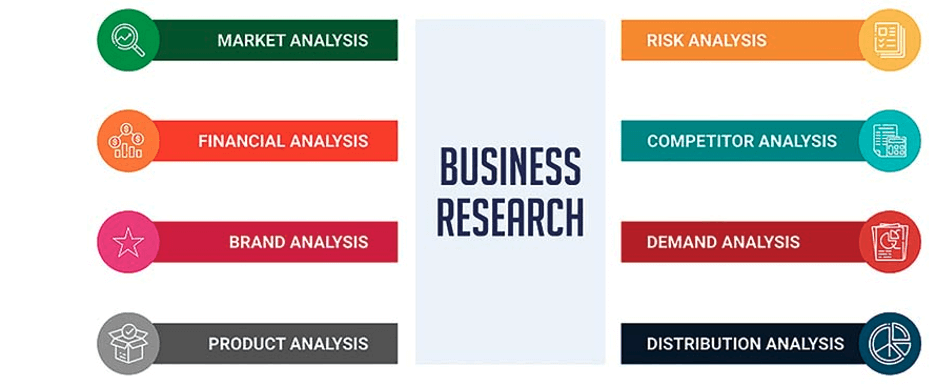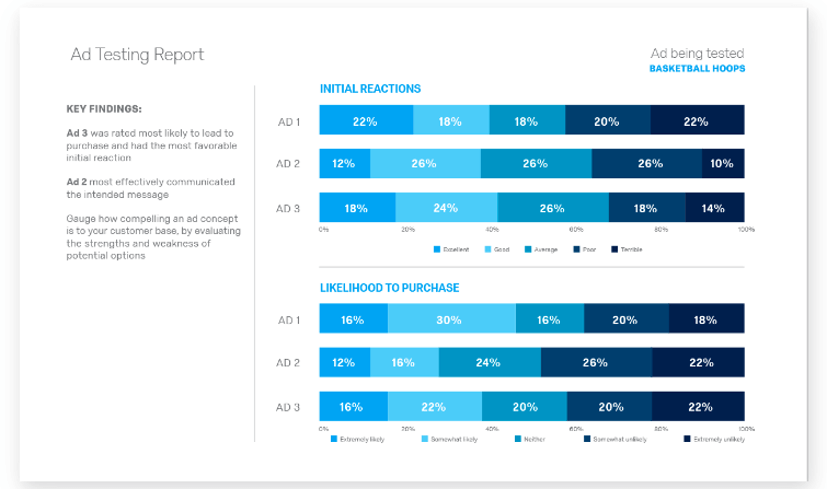What is business research?
Business research helps companies make better business decisions by gathering information. The scope of the term business research is quite broad – it acts as an umbrella that covers every aspect of business, from finances to advertising creative. It can include research methods which help a company better understand its target market. It could focus on customer experience and assess customer satisfaction levels. Or it could involve sizing up the competition through competitor research.
Often when carrying out business research, companies are looking at their own data, sourced from their employees, their customers and their business records. However, business researchers can go beyond their own company in order to collect relevant information and understand patterns that may help leaders make informed decisions. For example, a business may carry out ethnographic research where the participants are studied in the context of their everyday lives, rather than just in their role as consumer, or look at secondary data sources such as open access public records and empirical research carried out in academic studies.
There is also a body of knowledge about business in general that can be mined for business research purposes. For example organisational theory and general studies on consumer behaviour.
Free ebook: 2023 Global Consumer Trends Report
Why is business research important?
We live in a time of high speed technological progress and hyper-connectedness. Customers have an entire market at their fingertips and can easily switch brands if a competitor is offering something better than you are. At the same time, the world of business has evolved to the point of near-saturation. It’s hard to think of a need that hasn’t been addressed by someone’s innovative product or service.
The combination of ease of switching, high consumer awareness and a super-evolved marketplace crowded with companies and their offerings means that businesses must do whatever they can to find and maintain an edge. Business research is one of the most useful weapons in the fight against business obscurity, since it allows companies to gain a deep understanding of buyer behaviour and stay up to date at all times with detailed information on their market.
Thanks to the standard of modern business research tools and methods, it’s now possible for business analysts to track the intricate relationships between competitors, financial markets, social trends, geopolitical changes, world events, and more.
_______
Find out how to conduct your own market research and make use of existing market research data with our Ultimate guide to market research
_______
Types of business research
Business research methods vary widely, but they can be grouped into two broad categories – qualitative research and quantitative research.
Qualitative research methods
Qualitative business research deals with non-numerical data such as people’s thoughts, feelings and opinions. It relies heavily on the observations of researchers, who collect data from a relatively small number of participants – often through direct interactions.
Interviews
Qualitative research interviews take place one-on-one between a researcher and participant. In a business context, the participant might be a customer, a supplier, an employee or other stakeholder. Using open-ended questions, the researcher conducts the interview in either a structured or unstructured format. Structured interviews stick closely to a question list and scripted phrases, while unstructured interviews are more conversational and exploratory. As well as listening to the participant’s responses, the interviewer will observe non-verbal information such as posture, tone of voice and facial expression.
Focus groups
Like the qualitative interview, a focus group is a form of business research that uses direct interaction between the researcher and participants to collect data. In focus groups, a small number of participants (usually around 10) take part in a group discussion led by a researcher who acts as moderator. The researcher asks questions and takes note of the responses, as in a qualitative research interview. Sampling for focus groups is usually purposive rather than random, so that the group members represent varied points of view.
Observational studies
In an observational study, the researcher may not directly interact with participants at all, but will pay attention to practical situations, such as a busy sales floor full of potential customers, or a conference for some relevant business activity. They will hear people speak and watch their interactions, then record relevant data such as behaviour patterns that relate to the subject they are interested in. Observational studies can be classified as a type of ethnographic research. They can be used to gain insight about a company’s target audience in their everyday lives, or study employee behaviours in actual business situations.
Ethnographic Research
Ethnographic research is an immersive design of research where one observes peoples’ behaviour in their natural environment. Ethnography was most commonly found in the anthropology field and is now practices across a wide range of social sciences.
Ehnography is used to support a designer’s deeper understanding of the design problem – including the relevant domain, audience(s), processes, goals and context(s) of use.
The ethnographic research process is a popular methodology used in the software development lifecycle. It helps create better UI/UX flow based on the real needs of the end-users.
If you truly want to understand your customers’ needs, wants, desires, pain-points “walking a mile” in their shoes enables this. Ethnographic research is this deeply rooted part of research where you truly learn your targe audiences’ problem to craft the perfect solution.
Case study research
A case study is a detailed piece of research that provides in depth knowledge about a specific person, place or organisation. In the context of business research, case study research might focus on organizational dynamics or company culture in an actual business setting, and case studies have been used to develop new theories about how businesses operate. Proponents of case study research feel that it adds significant value in making theoretical and empirical advances. However its detractors point out that it can be time consuming and expensive, requiring highly skilled researchers to carry it out.
Quantitative research methods
Quantitative research focuses on countable data that is objective in nature. It relies on finding the patterns and relationships that emerge from mass data – for example by analysing the material posted on social media platforms, or via surveys of the target audience. Data collected through quantitative methods is empirical in nature and can be analysed using statistical techniques. Unlike qualitative approaches, a quantitative research method is usually reliant on finding the right sample size, as this will determine whether the results are representative. These are just a few methods – there are many more.
Surveys
Surveys are one of the most effective ways to conduct business research. They use a highly structured questionnaire which is distributed to participants, typically online (although in the past, face to face and telephone surveys were widely used). The questions are predominantly closed-ended, limiting the range of responses so that they can be grouped and analyzed at scale using statistical tools. However surveys can also be used to get a better understanding of the pain points customers face by providing open field responses where they can express themselves in their own words. Both types of data can be captured on the same questionnaire, which offers efficiency of time and cost to the researcher.
Correlational research
Correlational research looks at the relationship between two entities, neither of which are manipulated by the researcher. For example, this might be the in-store sales of a certain product line and the proportion of female customers subscribed to a mailing list. Using statistical analysis methods, researchers can determine the strength of the correlation and even discover intricate relationships between the two variables. Compared with simple observation and intuition, correlation may identify further information about business activity and its impact, pointing the way towards potential improvements and more revenue.
Experimental research
It may sound like something that is strictly for scientists, but experimental research is used by both businesses and scholars alike. When conducted as part of the business intelligence process, experimental research is used to test different tactics to see which ones are most successful – for example one marketing approach versus another. In the simplest form of experimental research, the researcher identifies a dependent variable and an independent variable. The hypothesis is that the independent variable has no effect on the dependent variable, and the researcher will change the independent one to test this assumption. In a business context, the hypothesis might be that price has no relationship to customer satisfaction. The researcher manipulates the price and observes the C-Sat scores to see if there’s an effect.
The best tools for business research
You can make the business research process much quicker and more efficient by selecting the right tools. Business research methods like surveys and interviews demand tools and technologies that can store vast quantities of data while making them easy to access and navigate. If your system can also carry out statistical analysis, and provide predictive recommendations to help you with your business decisions, so much the better.
eBook: 2023 Global Consumer Trends Report

